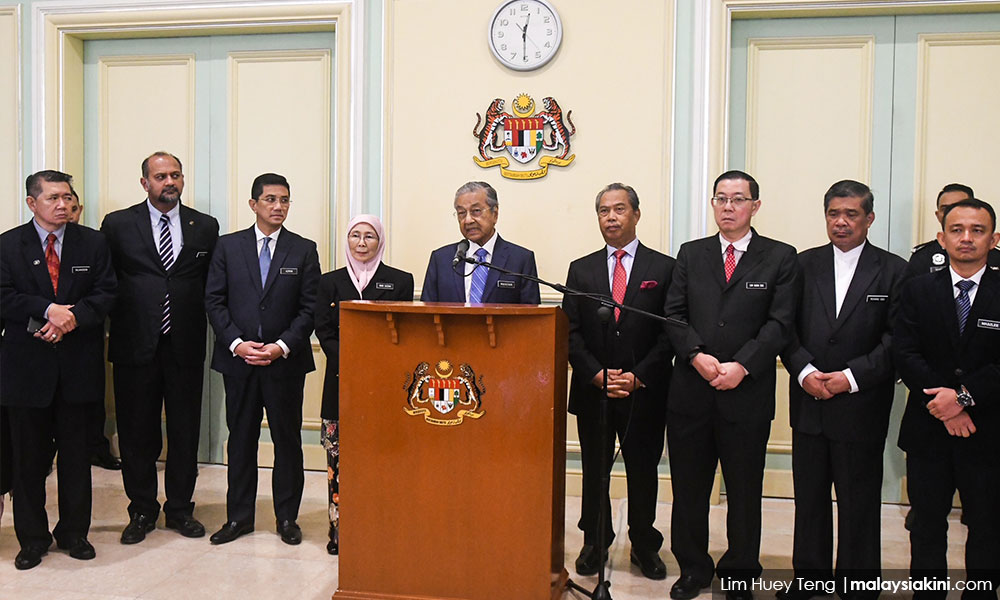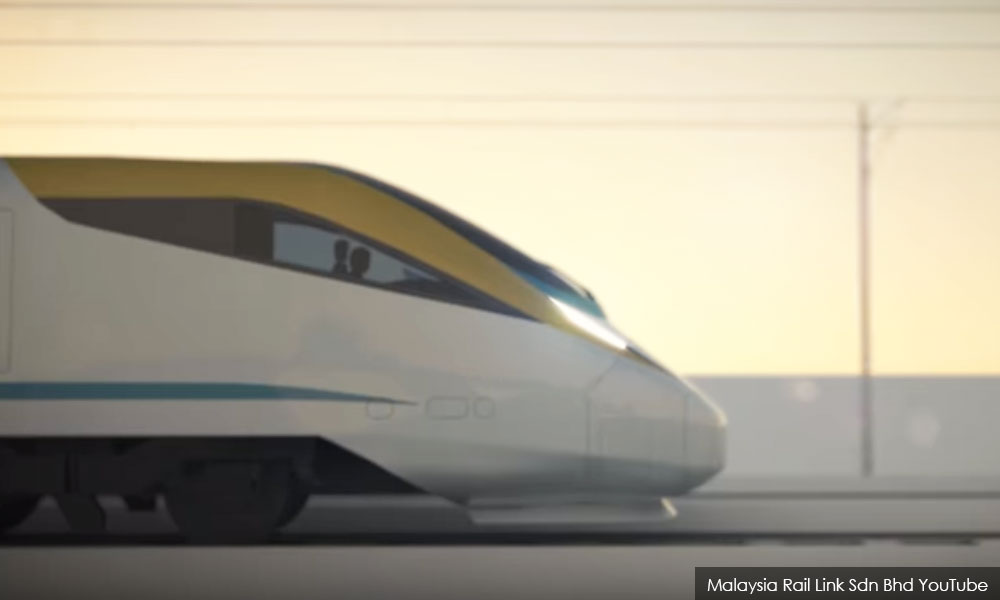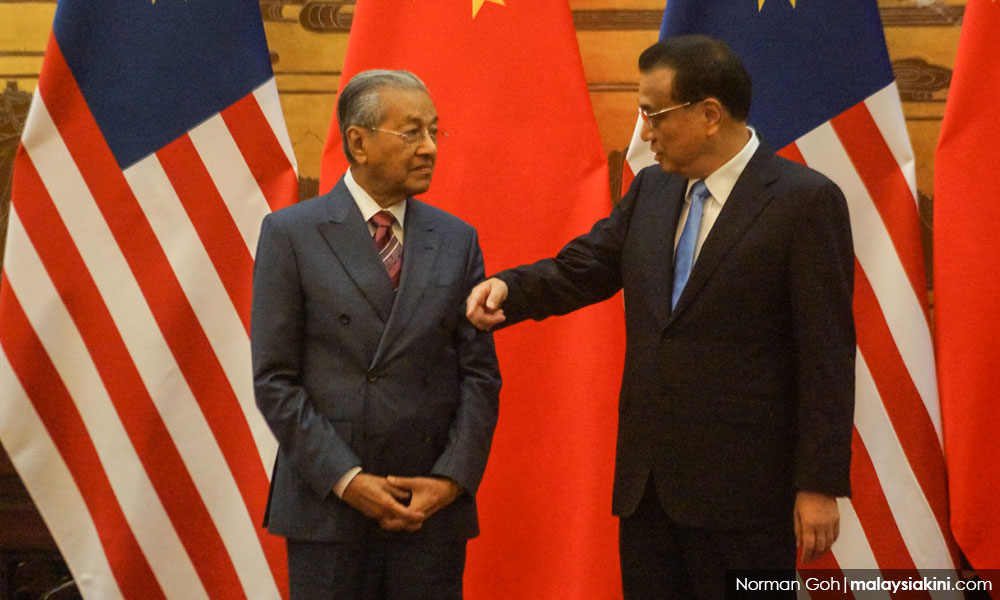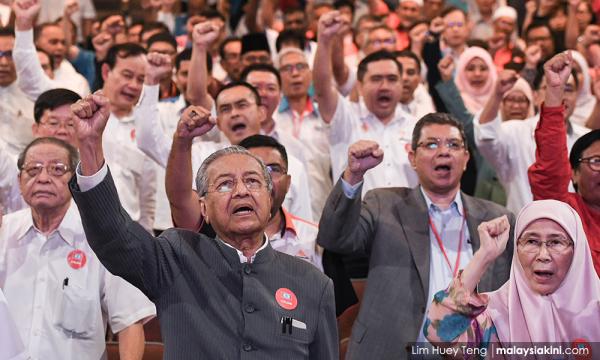COMMENT | There are many who are unhappy with the performance of the Pakatan Harapan government. The opposition understandably is the unhappiest of all. Some of their former leaders have been charged with multiple offences. Many of their previous allies have deserted them.
Umno and PAS have come together in an alliance of convenience. PAS under Abdul Hadi Awang has not moderated its position. And Umno appears to have veered towards the right. MCA and MIC are clinging on desperately to stay relevant. They organised demonstrations at every opportunity alleging betrayal of Malays, Islam and royalty. They have been successful in three by-elections, causing alarm within Harapan.
Harapan under Prime Minister Dr Mahathir Mohamad struggles to consolidate its position. Reforms have been slow in coming and there were some awkward U-turns on Icerd and the Rome Statute of the International Criminal Court. The non-publication of the recommendations of the Council of Eminent Persons and Committee on Institutional Reform has upset many.
The failure to implement more aggressively the pledges made in the joint manifesto has also caused much unhappiness. There was intense infighting within PKR. And there were concerns about whether PKR president Anwar Ibrahim would ever succeed Mahathir. That appears to have receded now.
The inexperience of Harapan ministers was apparent. Daim Zainuddin continues to play a big role.
Non-Malay expectations
The non-Malays want an end to race-based policies and practices. They want the government and government institutions and agencies to be more inclusive in their approach to development. They want poverty eradication measures to be race blind. They want an end to rhetoric that divides and separates.
Malay insecurities
Many Malays (difficult to know how many) fear the loss of privileges and entitlements without dominance. They consider the huge edifices created for bumiputera advancement to be sacred enclaves and react angrily at proposals for inclusion of the poor of other races. Some, like PAS, fear the end of their Islamic state agenda. And all of those who benefited from the gravy train that came from political influence and intermediation are angry. And, of course, those who made money on the side from bribes and other corrupt activities are now denied that income. And those facing charges publicly protest their innocence and work hard for a change in government.

Absence of a Harapan counter narrative
Given the fierceness of the racial rhetoric of the opposition and their ability to rally mass support, Harapan Malay ministers have been found wanting. They have tried to counter the allegations that they are puppets of the DAP and selling out the interests of the Malays and Muslims by reiterating their commitment to race and religion in exactly the way of the opposition.
The DAP has chosen to stay quiet. Non-Malays are alarmed. Where is the more inclusive vision of Harapan? Where is the vision that won them the election?
More recently, both Mahathir and Anwar have come out with statements that call for moderation and a multiracial approach to things.
The economy is everything
The cost of living appears to be the issue that affects those on fixed incomes. It is felt most acutely by the B40 (lower income) families or households.
With a huge public debt and the largest household debt in terms of percentage to GDP in the region, the resources of the government are stretched in trying to deliver on some of the reforms. The abolition of GST was considered by many experts to have been a mistake. The rate should simply have been reduced.
The same experts argue that the replacement sales service tax is more difficult to administer, brings in substantially less revenue and does not significantly lower the cost of living. Ending the tolls is not something that can be achieved without enormous compensation having to be paid to concessionaires.
Economic growth is key to the success of the government. But without money it will be difficult for the government to do very much. Sales of palm oil are made difficult by the green lobby in Western countries. And the trade war between the US and China threatens an economic slowdown.

The mega projects
After a difficult start with what was perceived to be corruptly made contracts and projects, the government has negotiated new arrangements with China and Chinese contractors on East Coast Rail Link (ECRL) project and Bandar Malaysia, which they consider more sensible. The ECRL cost has been reduced through a different alignment and a lower price which our government considers more reasonable.
Not all are satisfied that the renegotiated arrangements make the ECRL a viable project and worry about the long-term implications to the country of a hugely expensive unviable project funded by loans from China.
The go-ahead has been given for the huge Penang Transport Master Plan. Again, there are detractors whose concern is on the transparency of the process – its cost and its financial viability.
It appears that the government is anxious to re-start some deferred projects to inject life into a sluggish economy. There is also a need to re-establish our relationship with China on a better footing. China is our biggest trading partner and they have the funds to help us accelerate the development of our infrastructure. Some have urged caution at our becoming hostage to Chinese debt.
Employment, low wages, low productivity and educational reforms
Employment, low wages and low productivity of our workers are major problems. These problems are not going to be solved without educational reforms. Low standards of education at all levels hold us back. We are not training our young for the jobs that are there. The lack of English language proficiency affects the employability of school leavers and graduates in the private sector. Not all are suitable for university education. Many would be better off in vocational institutions or polytechnics.
The public sector cannot be used to soak up people who are not employable in jobs requiring skills. The government service also needs people who can think critically and are creative and productive. Thus far, there has been little evidence of radical root-and-branch reform in education.
Rural development and Felda
There are serious problems in the agricultural sector. Felda, for instance, needs restructuring and the injection of huge amounts of money. Felda settlers have high expectations but have little understanding of what exactly was done to bring them into this sorry state. They do not accept that it was the wrongdoings of the previous government that was responsible for this mess.
Farmers and fisherman languish using outdated farming and fishing methods. There is a need to give people a more direct role and responsibility for their jobs, their businesses and their lives. Placing money in the hands of people does not work for the long term. The correlation between effort, enterprise and reward must be deeply embedded in the minds of all our people.

Trading relationships
Mahathir has initiated talks with our major trading partners. In addition to China, he has been to the US and to Japan. He has made many trade trips. The Japanese have extended to us soft loans and there is the prospect of some Japanese universities establishing a presence in the country.
There are substantial investments by UK companies in the country primarily in robotics and artificial intelligence. We are also trying to resolve all outstanding issues with Singapore. Singapore is our second most important trading partner and there is much to be gained by us reaching agreement on the key issues that now bother us – maritime, airspace, bridges, rail links and water.
Hopefully, both governments act sensibly and find a way to quickly reach agreement on all issues. Sabre rattling and tough talk are not necessary.
Hopeful signs?
The picture for the last one year is somewhat hazy. A new government, inexperienced ministers, a huge debt burden, a corrupt and dysfunctional administration, unviable and hugely expensive megaprojects, a powerful PAS-Umno opposition pushing race and religious issues, infighting within Harapan, a disproportionate amount of energy and time consumed by going after those who milked the system and a somewhat ambiguous position on strategy coupled with ineffective communication, have produced a somewhat mixed result.
But the result is still better than it was. There is a need for us to adjust our expectations. And to be more patient. There is cause for optimism. There are signs of higher intelligence and good sense operating in some ministries. One year has gone by. Mahathir has one year left to effect the promised reforms. The poor are desperate. For them, delay has immediate implications. The hope now is that the reforms will now come at a more furious pace.
Need for clarity in the Harapan vision
Harapan’s vision must be clear. They must pursue the path of truth, fairness, inclusiveness and justice. They must do what is right. They must treat all Malaysians equally without compromising on the promise to ensure that Malays are not left behind. They must demonstrate quickly that it is possible to be just and fair and still meet the aspirations of all our people. They must show Malays that non-Malays and non-Muslims are not threats to Malays and Muslims. That diversity is an asset to the nation. That non-Malays have contributed and continue to contribute to the development, wealth, security and stability of the nation. That diversity enriches our lives and makes us a happier people.
On balance and with a perspective of how bad things were before GE14, I think that the first year has been a good year.
The writer is a lawyer and Malaysiakini subscriber/commenter.
The views expressed here are those of the author/contributor and do not necessarily represent the views of Malaysiakini.


